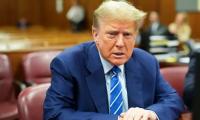Clerics offer services as peacemakers; Russia accused of assisting Taliban; Hezb-i-Islami to join peace talks; parents unhappy with court verdict on children deaths
PESHAWAR: A senior government functionary has conceded that their armed opponents had infiltrated different institutions, including security agencies and social networks, and they could easily reach their targets with the help of infiltrators.
Ahmad Zia Masood, Special adviser to President Ashraf Ghani on good governance and brother of the late Afghan mujahideen leader Ahmad Shah Masood, told a gathering in Kabul that this was a serious issue and the government should pay immediate attention to counter it.
Masood, who served as first vice president earlier with President Hamid Karzai, has been publicly opposing the peace talks with the Taliban and calling it a waste of time. He has also been critical of Pakistan and against trusting it to help restore peace in Afghanistan.
In the same function, former interior minister Omar Daudzai opined that it was a mistake to pin hopes on Pakistan for restoration of peace in Afghanistan as it has its own goals and it had been trusted and found wanting in the past.
Another former Mujahideen leader Prof Sayyaf on the occasion corroborated the claim made by Ahmad Zia Masood and said the armed opponents had found their way into the government institutions and were working from within the system to damage the government.
Meanwhile, the Afghan clerics are offering their services to the government to move forward the faltering peace process in the country. Hundreds of clerics from southwestern Afghanistan gathered recently in Kandahar to discuss the peace process.
They urged the government to change the composition of the High Peace Council and appoint neutral people to it to make it credible. The clerics from Kandahar, Helmand, Urozgan and Zabul felt the efforts made so far for peace had failed because the High Peace Council lacked credibility.
They were critical of the US role in peacemaking and termed it distrustful. The clerics said the neighbouring countries should be asked to extend true cooperation to restore peace in Afghanistan.
It needs mentioning that the Afghan clerics are a divided lot as many among themsupport the Taliban or prefer to stay neutral. The pro-government clerics are detested by the Taliban and many have been killed.
Meanwhile, a senior Afghan police official leading the cops in the fight against the Taliban in Kandahar province has alleged that Russia is providing financial and logistics support to the Taliban.
General Abdur Raziq, who has survived a number of Taliban attacks, claimed Russia has recently increased its assistance to the Taliban. This is the first time that a known and important Afghan police official has made such an allegation.
General Raziq reiterated his allegation that Pakistan was backing the Taliban and had provided them heavy weapons also. He claimed Pakistan also sent its troops to carry out attacks in Maroof district of Kandahar, which was the birthplace and headquarters of the Taliban movement. The Afghan government in Kabul didn’t make this allegation against Pakistan.
Meanwhile, the Hezb-i-Islami of former mujahideen leader Gulbadin Hekmatyar, who has been declared a wanted global terrorist, has become the first armed group to formally declare its readiness to hold peace talks with the Afghan government.
The Taliban have rejected the peace talks, but the Hezb-i-Islami has held negotiations with the Afghan government in the past also and had given broad indications that it would join the peace process if formally invited to do so. It eagerly welcomed the invitation from President Ashraf Ghani, who twice in recent weeks mentioned the party as one of the armed groups with which peace talks would be held.
Though the Hezb-i-Islami alleged that the US was opposed to the peace process and that elements in the Kabul administration looked at the peace talks as a threat to their power and privileges, it said it would take part in the talks because it wanted to show to the Afghan nation that Hezb-i-Islami wanted peace in Afghanistan.
The party argued that the pro-war attitude of the US became obvious recently when Washington declared two more Hezb-i-Islami members as global terrorists and included their names in the ‘blacklist’ just when the Afghan government was inviting it to join the peace process. It recalled that the US had made a similar announcement in the past when Hezb-i-Islami and the Afghan government were engaged in peace talks.
The decision by the Hezb-i-Islami to join the peace process won’t have much impact as it doesn’t have many fighters. This is the reason all focus is on persuading the Taliban to participate in the peace talks.
The Afghan government’s High Peace Council welcomed Hezb-i-Islami decision to join the peace talks and described it as a positive development. However, it agreed to meet a delegation of the rival faction of Hezb-i-Islami led by Humayun Jarir.
The mainstream Hezb-i-Islami led by Hekmatyar promptly disowned the other faction and made it clear Dr Ghairat Baheer and Qazi Mohammad Hakim had the authority to represent the party.
Meanwhile, the families of the 10 children killed in the mortar fire in Syedabad district of Wardak province three months ago have been expressing their dissatisfaction with the verdict of the court in the case against the Afghan National Army soldiers who were behind the attack. The court sentenced two soldiers to 15 years imprisonment each while their commander was given two years sentence. The mortar shells fired by the soldiers fell in front of a mosque where the children were playing and killed 10 of them. Their families and the people in the area staged protests and threatened to block the road passing through their villages to Kabul if those responsible for the tragedy weren’t punished.
President Ashraf Ghani and his ministers had promised to punish those found responsible for the deaths of innocent children. Badam Gul, father of three slain children, said the court verdict was unacceptable to his family as it was announced in their absence. He argued that the commander of the troops was sentenced to only two years imprisonment even though he had ordered the soldiers to fire. He alleged that the commander had used his links with influential people to manage to get away with two-year sentence only.
Judge raised the query after warning to announce the verdict if Maneka’s lawyer remained absent from the hearing and...
The development came amid the United States’ explicit opposition to the bilateral project
Qaiser claimed that both parties rejected entire process which led to the formation of the incumbent government
She examined a proposed site for the construction of a state-of-the-art hospital in Murree and approved
Raoof Hasan warned against any attempt to extend the tenure of Chief Justice of Pakistan Qazi Faez Isa by another...
These payments will help PBA members to clear some of their liabilities







